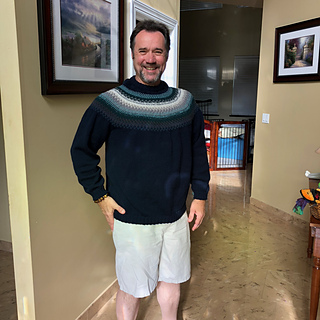patterns > Rib Magazine >  Rib Magazine No. 3 | ALCHEMY
Rib Magazine No. 3 | ALCHEMY
> Alchemy Pullover







Alchemy Pullover
The Alchemy Pullover is a masterful blend of colorwork and texture. The seamless sweater is knit from the bottom up and uses stranded textural colorwork in the yoke to create shimmering bands of color across the chest. The stitch patterns are worked with set color changes to produce subtle transitions between yarns. The design features 10 colors, but included in the pattern is an alternate five-color version.
Finished Measurements
Chest circumference: 38 (42¾, 46½, 50¼, 54, 58¾)” / 95 (106.5, 116, 125.5, 135, 146.5) cm
Shown in size 46½” / 116 cm with 3” / 7.5 cm of positive ease
Needles
One 24” / 60 cm circular needle in sizes US 7 / 4.5 mm and US 5 / 3.75 mm
One 32” / 80 cm circular needle in sizes US 7 / 4.5 mm and US 5 / 3.75 mm
One 40” / 100 cm circular needle in size US 7 / 4.5 mm (All sizes EXCEPT 38” / 95 cm & 423⁄4” / 106.5 cm)
One 60” / 150 cm circular needle in size US 7 / 4.5 mm (Sizes 54” / 135 cm & 583⁄4” / 146.5 cm ONLY) Needles for small circumference knitting (DPNs or long circular for magic loop) in sizes US 7 / 4.5 mm and US 5 / 3.75 mm
Or use a needle size to obtain gauge after blocking
Yarn
MC: 8 (9, 9, 10, 10, 11) skeins of Brooklyn Tweed Arbor (100% targhee; 145 yd / 42 m per 50 g) or 1160 (1233, 1305, 1378, 1450, 1523) yd / 1061 (1128, 1194, 1260, 1326, 1393) m of DK weight yarn
CC1: 1 skein of Brooklyn Tweed Arbor (100% targhee; 145 yd / 42 m per 50 g) or 28 (32, 36, 41, 47, 54) yd / 26 (30, 33, 38, 43, 50) m of DK weight yarn
CC2: 1 skein of Brooklyn Tweed Arbor (100% targhee; 145 yd / 42 m per 50 g) or 28 (32, 36, 41, 47, 54) yd / 26 (30, 33, 38, 43, 50) m of DK weight yarn
CC3: 1 skein of Brooklyn Tweed Arbor (100% targhee; 145 yd / 42 m per 50 g) or 42 (47, 54, 61, 70, 81) yd / 39 (43, 50, 56, 64, 74) m of DK weight yarn
CC4: 1 skein of Brooklyn Tweed Arbor (100% targhee; 145 yd / 42 m per 50 g) or 38 (43, 50, 56, 64, 74) yd / 35 (40, 46, 52, 59, 68) m of DK weight yarn
CC5: 1 skein of Brooklyn Tweed Arbor (100% targhee; 145 yd / 42 m per 50 g) or 34 (39, 45, 51, 59, 67) yd / 32 (36, 42, 47, 54, 62) m of DK weight yarn
CC6: 1 skein of Brooklyn Tweed Arbor (100% targhee; 145 yd / 42 m per 50 g) or 38 (43, 50, 56, 64, 74) yd / 35 (40, 46, 52, 59, 68) m of DK weight yarn
CC7: 1 skein of Brooklyn Tweed Arbor (100% targhee; 145 yd / 42 m per 50 g) or 21 (24, 27, 31, 35, 41) yd / 20 (22, 25, 29, 32, 38) m of DK weight yarn
CC8: 1 skein of Brooklyn Tweed Arbor (100% targhee; 145 yd / 42 m per 50 g) or 19 (22, 25, 28, 32, 37) yd / 18 (21, 23, 26, 30, 34) m of DK weight yarn
CC9: 1 skein of Brooklyn Tweed Arbor (100% targhee; 145 yd / 42 m per 50 g) or 17 (20, 23, 26, 30, 34) yd / 16 (19, 21, 24, 28, 32) m of DK weight yarn
Sample shown in Brooklyn Tweed Arbor in Loam (MC), Carob (CC1), Parka (CC2), Crumb (CC3),
Klimt (CC4), Tincture (CC5), Heron (CC6), Gale (CC7), Driftwood (CC8), and Thaw (CC9)
Notions
Stitch markers (one in a distinct color or style for BOR), waste yarn, tapestry needle
Gauge
21 sts and 30 rnds = 4” / 10 cm in St st using US 7 / 4.5 mm and after blocking
24 sts and 24 rnds = 4” / 10 cm in Chart A or B using US 7 / 4.5 mm and after blocking
Notes
This garment is worked seamlessly in the round from the bottom up. The body is worked from the hem to the underarms in stockinette without shaping. The sleeves are worked similarly from the cu to the underarm and are shaped with paired symmetrical increases. The stitches for the body and both sleeves are then joined together on one set of circular needles to work the yoke. The underarm stitches are placed on waste yarn and are grafted together during the nishing process. Short-row shaping is worked at the shoulders to increase the back length of the garment.
The design uses 10 colors in total: one main color and nine contrast colors. Provided at the end of the pattern is an alternate version that uses five colors only—one main color and four contrast colors.

9442 projects
stashed
7694 times
- First published: October 2017
- Page created: September 28, 2017
- Last updated: June 18, 2022 …
- visits in the last 24 hours
- visitors right now




